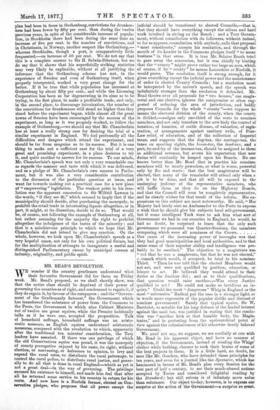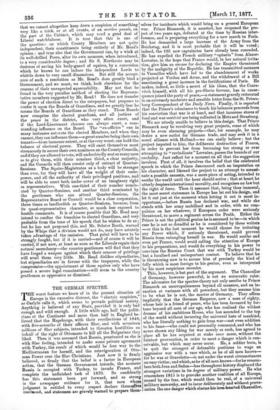MR. READ'S REVOLUTION.
WE wonder if the country gentlemen understand what their favourite Government did for them on Friday week. Mr. Read's proposal, as we shall shortly show, was that the entire class should be deprived of their power of governing the counties as of right, and condemned to regain it, if they do regain it, by favour of the ratepayers ; and the "Govern- ment of the Gentlemanly Interest,' the Government which has transferred the substance of power from the Commons to the Peers, the Government in which nine Cabinet Ministers out of twelve are great squires, while the Premier habitually talks as if he were one, accepted the proposition. Talk of household suffrage, household suffrage was an aristo- cratic measure, as English squires understand aristocratic measures, compared with the revolution to which, apparently after the traditional ten minutes' consideration, the Tory leaders have assented. If there was one privilege of which the old Conservatives squire was proud, it was the monopoly of county prerogative enjoyed by his caste, its right, without election, or canvassing, or deference to opinion, to levy and expend the rural rates, to distribute the rural patronage, to control the rural police, to distribute rural justice, and gener- ally to do all that is done in rural England—which as yet is not a great deal—in the way of governing. The privilege excused his existence to himself, and-made him feel that after all he returned some service to his country in return for his rents. And now here is a Norfolk farmer, elected on Con- servative pledges, who proposes that all power (swept the judicial should be transferred to elected Councils,—that is, that they should have everything except the odium and hard work involved in sitting on the Bench ; and a Tory Govern- ment, without consultation with its followers, without indeed, so far as appears, consultation with anybody, calls that proposal "most considerate," accepts his resolution, and through the mouth of its Leader in the Commons pledges itself "to mean business" in that sense. It is true Mr. Sclater Booth tried to pare away the concession, but it was chiefly by hinting that the " county " might prove rather too large an area, which of course, if by "county" he means Lancashire or Norfolk, it would prove. The resolution itself is strong enough, for it gives everything except the judicial power and the maintenance of order to elected County Councils ; but a resolution must be interpreted by the mover's speech, and the speech was indefinitely stronger than the resolution it defended. Mr. Read throws over all proposals for "two houses," one magis- terial and one elective, ignores the compromise so often sug- gested of reducing the area of jurisdiction, and boldly proposes Councils for the whole "county "—we suppose he means the electoral division of the county, when the county is divided,—assigns only one-third of the seats to nominee members, and not only transfers to the new body the control of taxation, of lunatics, of cattle disease, of valuation, of regis- tration, of arrangements against sanitary evils, of Poor- Law relief, of education, and of the collection of Imperial taxes, and suggests that the dog-tax, the carriage-tax, the taxes on sporting rights, the house-tax, the land-tax, and a part, by-and-by of the income-tax, should be assigned to them as additional revenue, but avows his expectation that new duties will continally be heaped upon his Boards. No one knows better than Mr. Read that in practice his nominee members will be nearly powerless, or what is worse, powerful only by fits and starts ; that the best magistrates will be elected, that many of the remainder will attend only when a job is to be done, and that all will be exposed to the unsleeping jealousy of the representative members, who will baffle them as they do on the Highway Boards, and that the Council will soon be completely representative, and he clearly wishes for that result of the reform. His ex- pressions on this subject are most noteworthy. He said, ." Her Majesty had lately sent an Ambassador to the Porte to express a wish that he should give his subjects local self-government, but if some intelligent Turk were to ask him what sort of Government we had in our counties in England, he would, he had no doubt, be surprised to learn that the only such government we possessed was Quarter-Sessions, the members
composing which were all nominees of the Crown One cause of the increasing power of boroughs was that they had good municipalities and local authorities, and to that cause some of their superior ability and intelligence was pro- bably to be ascribed." The objection to a magistrate was "not that he was a magistrate, but that he was not elected," a remark which would, if accepted, be fatal to his nominee Third. "Then he was told that the elected Members would not act, and were not qualified by position, education, or leisure to act. He believed they would attend to their duties as the Justices did ; and as to their qualifications, that question would raise another,—Was every Justice qualified to act ? He could not make so invidious an in- quiry." Could the most " dangerous " Whig in England or the most " subversive " Radical put the case in a stronger light, or in words more expressive of the popular dislike and distrust of nominee government? Surely that typical squire, Sir W. Barttelot, so notable for his long defence of the landed interest against the malt tax, was justified in stating that the resolu- tion was "another kick at that humble body, the Magis- trates," and in protesting from the squirearchical point of view against the submissiveness of his otherwise dearly beloved Government.
We need not say, we suppose, we are cordially at one with Mr. Read in his apparent object, and have no manner of objection if the Government, instead of stealing the Whip' clothes while bathing, chooses to suck their brains of some of the best projects in them. It is a little hard, no doubt, for men like Mr. Goschen, who have defended these principles f9r ten years, and even for a journal like the Spectator, whieh has hammered in favour of Mr. Read's plan every Session for the best part of half a century, to see their much-abused notienS accepted by Tories and considered delightful reading by the Standard; but still reform is of infinitely more salue than reformers. Our object to-day, however, le to elpeilik surprise at the action of the Clovernsaent—a imp* 0,4 rviWt.
if the Lord-Lieutenant chooses can always exert, a corn- We are utterly unable to believe in this design. That Prince manding influence on the Board. The "ex-officios " can in Bismarck may be revolving very great projects, some of which many instances out-vote the elected Members, and when they may be even alarming projects—that, for example, he may cannot, they can influence them—a great number being their own desire a new outlet for German trade, and may seek it in a tenants—to an immense extent, or at the very worst, can hold the novel alliance with Holland—we can easily believe ; but the balance of electoral power. They will exert themselves most project imputed to him, the deliberate destruction of France, strenuously to secure their own nominees on the County Councils, in order to prevent her from becoming too strong or ever and if they are allowed to vote, will undoubtedly seat so many men attempting to " revindicate "Lorraine, passes the bounds of our as to give them, with their nominee third, a clear majority, credulity. Just reflect for a moment on all that the suggestion and the Councils will then consist only of extract of Quarter- involves. First of all, it involves the belief that the celebrated Sessions. The Squire-Magistrates as a body will be stronger speech in which the Prince denounced such an imputation on than ever, for they will have all the weight of their caste- his character, and likened the project to an attempt to assassi- power, and all the authority of their privileged positions, and nate a possible assassin, was a mere piece of acting, intended to will be able to exert both under cover of an imaginary right soothe the world until the hour should arrive ; that at heart he as representatives. With one-third of their number nomin- utterly despises international morality, and recognises no law but ated by Quarter-Sessions, and another third nominated by the right of force. Then it assumes that, being thus immoral, the gentlemen who can attend Quarter-Sessions, the the most secret statesman in Europe has let out his design, and Representative Board or Council would be a close corporation, let it out just at the moment when letting it out is most in- three times as landlordish as Quarter-Sessions, because, from opportune,—before Russia has declared war, and while she its quasi-representative character, so much less exposed to stands with her army mobilised and in order, with no corn- hostile comments. It is of course possible that Mr. Read may pulsion on her whatever, if European order were seriously intend to confine the franchise to elected Guardians, and very threatened, to move a regiment across the Pruth. Either the probable from the tone of his speech that he wishes to do so ; Prince is not the political genius he is assumed to be—in which but he has not proposed this, and Mr. Sclater Booth, warned case he is not so dreadful as he is considered by these writers by the Whips that a division would not do, may have astutely —or this is the last moment he would choose for irritating taken advantage of the omission. That point will have to be any Power which, if seriously threatened, could prevent strongly fought, but if it is carried—and of course it will be Russia from entangling herself in war. He would soothe and carried, if not now, at least as soon as the Liberals regain their even pet France, would avoid calling the attention of Europe natural ascendancy—the country gentlemen will find that they to his preparations, and would do everything in his power to have forged a weapon against which their armour of privilege convince the Russian Court that war with Turkey would be will avail them very little. Mr. Read dislikes stipendiaries, but a localised and unimportant contest. To believe that he but stipendiaries are in favour with the taxpayers, while the is threatening now is to accuse him of precisely the kind of compromise—the appointment of those squires only who have folly which is most foreign to his genius, even as interpreted passed a severe legal examination—will seem to the country by his most suspicious enemies.



































 Previous page
Previous page